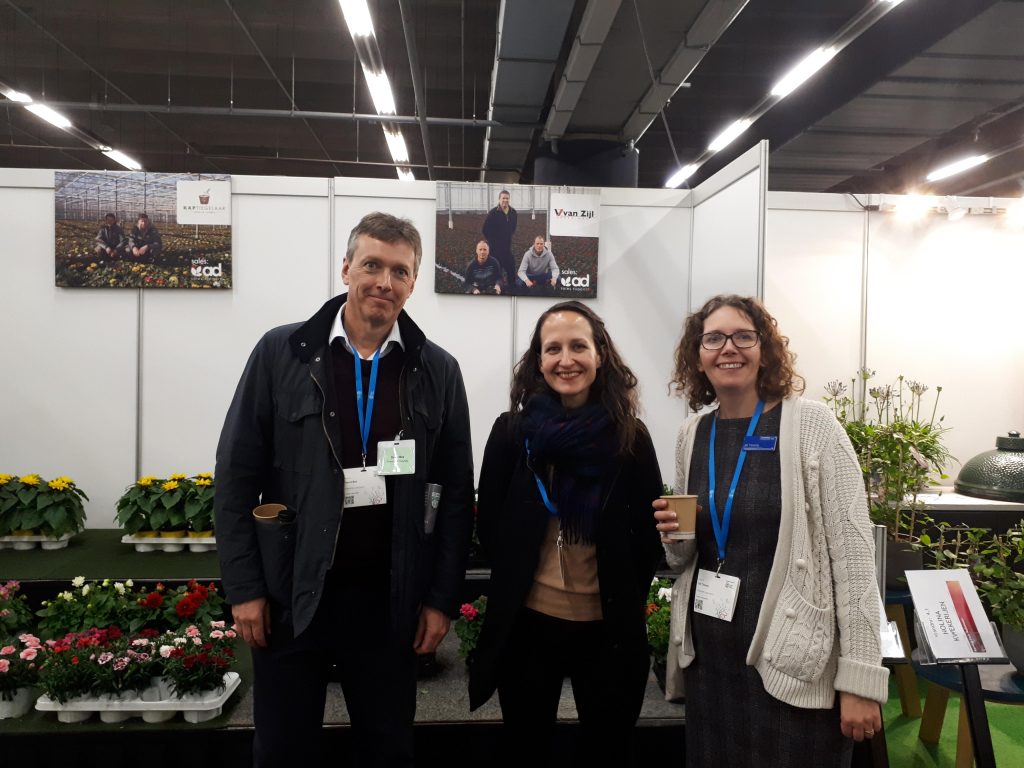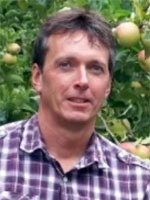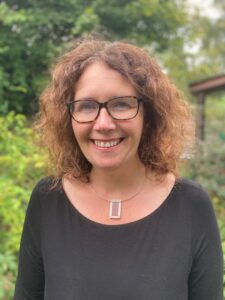We are a small team of researchers based at Coventry University and the University of Surrey, UK, who have been researching the cut-flower industry for over two decades. A key focus of our work is to ask the fundamental question:
What does a sustainable flower look like?
In order to tackle this question, we have visited farms, packhouses and retail outlets in locations as diverse as Naivasha, Aalsmeer, Lancashire and Cape Town, interviewed florists up and down the United Kingdom and attended international flower events, such as the Royal Flora Holland Trade Fair. We have staged three workshops, which has enabled us to build an active Stakeholder Group drawn from across different parts of the cut-flower industry. This project is very timely for those working with flowers, for consumers and wider society, as it is tackles questions about what sustainability means in practice and therefore how the cut-flower industry can continue to flourish in the context of acute environmental, social and political challenges.
About the Research
Promoting Sustainability in the Cut-flower Industry
Weddings, funerals, Valentine’s Day – we buy flowers to show that we care on all sorts of occasions. But where do these flowers come from in the first place? Who has produced them, what are their working conditions like, and what are the impacts on the environment? And what information is available to consumers to make informed choices about the flowers they buy?
These are exactly the questions we have been asking ourselves to guide our research project on Promoting Sustainability within the Cut-flower Industry. We work with stakeholders from the cut-flower industry, NGOs, certification bodies, and retailers to understand current standards and practices and inform new models for the industry to create social and environmental benefits as well as create value for businesses.
The Rationale
In the UK, the cut-flower market is worth over £2 billion, with over 7,000 florists with approximately 60% of sales taking place via supermarket retailers (Mintel 2015). About 90% of the cut-flowers sold in the UK are imported from abroad. Whilst the Royal Flower Holland Dutch Auction, which draws in cut-flowers from around the world, remains the largest wholesale source of cut-flowers, most UK retailers source from importers with direct supply links to producers. The global flower industry, worth around £42 billion, has grown significantly over the last two decades, with newly developing countries, including Kenya, Colombia, and Ethiopia aggressively pursuing exports.

However, the cut-flower industry has been associated with poor and precarious working conditions and a range of serious environmental concerns. For example, intensive flower production and international air transport leads to high carbon and water footprints; agrochemical pollution has been problematic in sensitive ecosystems such as Lake Naivasha in Kenya and working conditions have been linked to political unrest in Ethiopia. The causes of these problems are complex, often rooted within local regulatory and institutional weaknesses, which are exacerbated by the dynamics of the market.
Our research examines the role that standards, certifications, and improvement models are playing, and can play, in driving up social and environmental outcomes at different points within cut-flower supply chains. Analytically we draw from the Global Value Chains and Circular Economy literatures. These bodies of work provide a basis for untangling drivers to generate social, economic, and environmental advancements at individual nodes of the supply chain.
Our Approach
We are working closely with industry stakeholders to address key questions about the role of standards and certifications in the future. This is especially pressing as very real concerns about the impacts of climate change in flower production areas need to be addressed. Equally, there are signs that consumers in more affluent global markets are becoming more concerned about the sustainability credentials of their purchases, including flowers.
Our key-stakeholders include:

- Certification bodies
- Flower wholesalers
- Event florists, high-street florists, and small-scale grower florists
- Retailers
- Non-governmental Organisation
We have been bringing these people together during our multi-stakeholder workshops, which have run every year since 2017. Our last workshop, held in the Netherlands, resulted in the formation of a steering committee, to support the collaboration between us at Coventry University and our various partners throughout the year.
Funding
The importance of our research into the sustainability of the cut-flower industry has been validated through several internal and external grants, including the following:
- UK Government’s Department for International Development (DFID) later Foreign, Commonwealth and Development Office (FCDO)
- British Academy Leverhulme Trust
- 2 x Coventry University Pump Prime Grants
- WWF-South Africa Table Mountain Fund
- Coventry University Impact and Knowledge Exchange in Social Science Fund
- Coventry University Impact Acceleration Grant
- Coventry University Quality Related Strategic Priorities Fund
- Various sources of in-kind funding from industry project partners to assist with the holding of events.
Links to funded projects
As our project develops, we continue to apply for different funding schemes to grow our research impact.
About Us


David Bek (Project Co-lead)
David is Professor of Creative Economies and Ecological Sustainability at Coventry University (UK) where he is a theme leader within the Centre for Creative Economies. David has extensive experience of undertaking research into sustainability within horticultural supply chains, especially cut-flowers. He has worked alongside organisations in the fruit, wine and flower sectors in South Africa to develop training courses and monitoring and evaluation tools to promote enhanced sustainability in practice. David is leading research projects which evaluate how upgrading sustainability practices lead to improvements in businesses’ resilience, productivity and profitability. David is currently engaging with stakeholders in the UK cut-flower sector with a view to implementing key sustainability principles across the sector. He has delivered keynote addresses on sustainability at forums such as the Association of International Horticultural Producers Spring Meeting 2019 and the UK’s Horticultural Trade Association’s ‘Cultivating Retail’ Annual Conference 2019.
David Bek | @DaveDBRS | Research Portal Biography

Jill Timms (Project Co-lead)
Jill is a Senior Lecturer in Sociology at the University of Surrey, where she is Programme Director for the Masters in Social Research Methods and Short Courses. Prior to this Jill was the Associate Head of School for Research in the School for Strategy and Leadership and continues as an Honorary Fellow at the Centre for Business in Society there. She is a sociologist of work and organisations, with a longstanding interest in how notions of responsibility are understood within globalising capitalism. Her research focuses on sustainability practices, responsibilities to workers in complex global supply chains; private social standards, such as fair trade; and the role of different groups, such as consultants, campaigners, governments and consumers, in determining agendas of corporate social responsibility (CSR). Jill is has been researching the horticultural sector for over 20 years. Her PhD from London School of Economics (LSE) included an evaluation of certification development in the global cut-flower sector. She works with key industry stakeholders to improve sustainability, has been funded by the British Academy/Leverhulme Trust and is currently co-investigator for a DFID Covid rapid response project with Fairtrade, MM Flowers and key UK retailers. Jill also works as an Independent Consultant, is a committee member of the Global Studies Association and Co-Convenor of the Work, Employment and Economic Group of the British Sociology Association. Her keynote addresses on certification and sustainability include to the British Florist Association’s Annual Conferences 2017, 2019 and FleurEx 2019.
Jill Timms | @JillLTimms | Research Portal Biography

Nora Lanari (Co-investigator)
Nora is a postdoctoral research fellow at the School of Geography, Environment and Earth Sciences at Victoria University of Wellington, New Zealand. Her research investigates the link between global value chains and local environmental management and governance, with a specific focus on water and horticultural industries. Nora completed her PhD with David and Jill at Coventry University and has been a research assistant on the Global Cut Flower Network Project since its inception in 2016. Previously, she studied and researched at the University of Bern, Switzerland, investigating water use on large-scale cut-flower farms in Laikipia, Kenya.
Nora Lanari | @NoraLanari

Rebecca Beech (Research Assistant)
Rebecca was recently awarded her PhD in Marketing at the Centre for Business and Society, Coventry University. She has been a Research Assistant on the Sustainable-Cut Flowers project since February 2020 and had a short role within the project in 2017 during a workshop with the project’s stakeholders. Rebecca’s research interests entail sustainable consumption, pro-environmental behaviour, online consumer behaviour and knowledge sharing. Her postgraduate and undergraduate degrees research at Coventry University explored consumers’ ethical and green consumption within the context of clothing.
Rebecca Beech | @RebeccaBeechCU | Research Portal Biography
